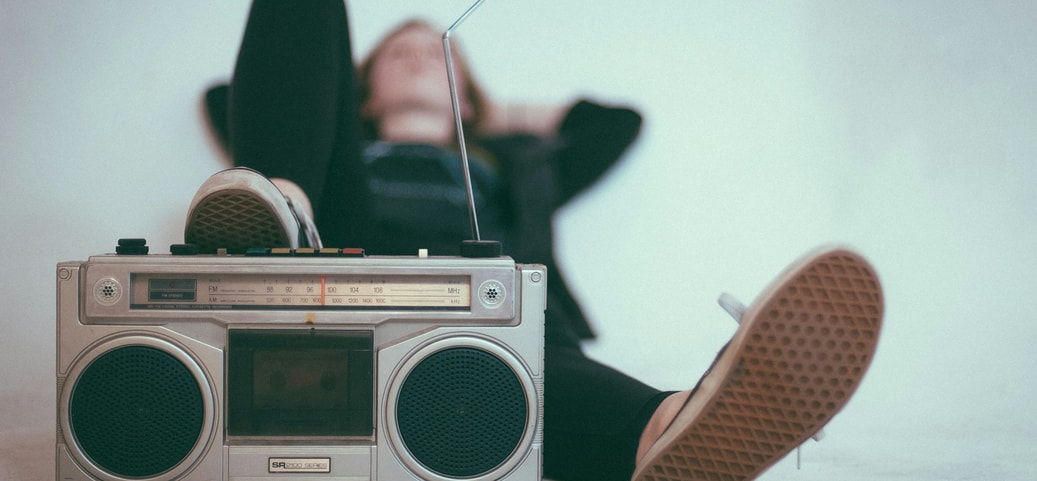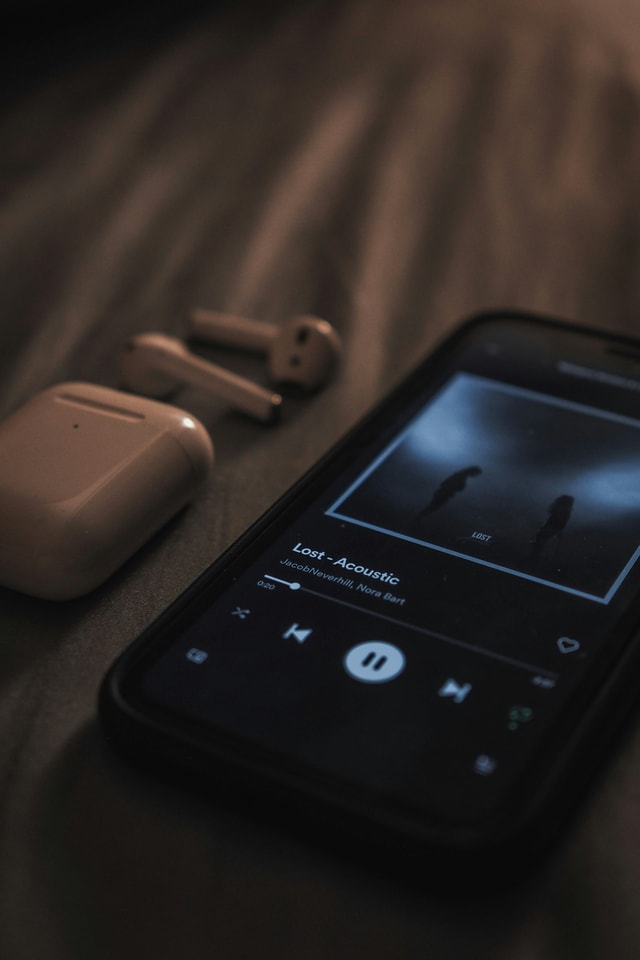When the silence gets too loud: Does falling asleep with music promote sleep?
For many people, falling asleep in complete silence is a challenge. The head is still full of thoughts, and every little noise is suddenly perceived as very loud. This is where falling asleep with music can be a wonderful solution. The right sounds create a calming atmosphere and can make the transition to sleep easier. But does sleeping with music really improve the quality of sleep? And which sounds are the right ones?
by CALIDA
October 31, 2024•5 min reading time

Fall asleep with gentle sounds: music as a relaxing accompaniment for a restful night.
Table of Contents
Do you fall asleep better with music? This could be the reason!
• Calming music lowers blood pressure & pulse
• Music can distract from negative thoughts
This music can contribute to a better sleep
• Calm & harmonious sounds without surprises
• Rather unsuitable for falling asleep: Heavy metal or break-up songs
Good & less good alternatives to sleep music
• TV, podcasts & radio plays only for falling asleep
• Sounds of nature: Fall asleep with waves, birdsong & rain
Do you fall asleep better with music? This could be the reason!
Have you ever noticed that you fall asleep better with music? This is not that rare. Music can help you fall asleep faster and more relaxed in many different ways. We’ll explain what’s behind it.
Calming music lowers blood pressure & pulse
Studies show that calming music has a direct effect on the body. If you want to fall asleep, the right music can help you lower your blood pressure and pulse rate. Similar to calming fragrances or certain teas, the right music releases less of the stress hormone cortisol.
This physical relaxation is a key factor in falling asleep quickly and improving the quality of sleep. In particular, soft piano music or instrumental pieces without vocals have a calming effect on many people and thus promote restful sleep.
Music can distract from negative thoughts
In addition to purely physical relaxation, music also has the ability to influence your psyche, for example by drowning out negative thoughts. It’s often worries and brooding that prevents from falling asleep. And when it’s very quiet in the evening, these thoughts often become all the louder.
Music draws the focus away from these pipe dreams and helps the mind to slip into a more relaxed state. You concentrate on the sound instead of your thoughts or the to-dos that await you the next day. This makes it easier to find the necessary calm and fall asleep peacefully.

"Lost - Acoustic" playing on iPhone with AirPods on a soft surface.
This music can contribute to a better sleep
Not all music is equally suitable for helping you fall sleep. The best results are achieved with calm music that doesn’t contain sudden changes in volume or unpleasant sounds. You’ll find out now what this looks – or rather sounds – like and which music is rather unsuitable for falling asleep and staying asleep.
Calm & harmonious sounds without surprises
If you want to fall asleep better with music, calm and harmonious sounds are the right choice. Music with a steady rhythm and without abrupt changes has a particularly calming effect, which helps you fall asleep faster. Gentle melodies from classical music or ambient sounds can often work wonders.
Of course, it’s important that you don’t dislike the music you are listening to to fall asleep. But the opposite can also be dangerous. It’s actually best if you don’t have strong positive or negative associations with the music and it doesn’t require too much attention. The music should calm your mind in every way, rather than stimulate it.
Rather unsuitable for falling asleep: Heavy metal or break-up songs
Of course, everyone has a different taste in music. Nevertheless, you should come to terms with the fact that not all music is suitable for falling asleep relaxed. Loud and emotional music like heavy metal, aggressive rap songs or sad ballads can have the opposite effect. They stimulate the mind and often trigger strong emotions that make it difficult to fall asleep.
In addition, classical songs from pop music, hip-hop, metal or punk often contain different volumes, rhythm changes and other surprises that can unconsciously disturb your sleep. You should also avoid break-up songs that remind you of sad experiences if you want to fall asleep peacefully.
Good & less good alternatives to sleep music
In addition to classic sleep music, there are also other acoustic aids that can help you fall asleep. However, not everything that appears to calm you down actually promotes a good night’s sleep or sleep through the night.
TV, podcasts & radio plays only for falling asleep
Television, podcasts and radio plays are popular alternatives to sleep music. Many people use these media to fall asleep. But they should be enjoyed with caution. Even if it initially seems relaxing, this content can activate the brain and impair the quality of sleep, especially if it runs for too long.
Here too, it’s mainly the different volumes and sudden, loud noises that wake you up. Even if you are not aware of these waking phases at all, they can affect your sleep quality and cause shorter deep sleep phases and therefore less rest the next day.
A timer is very helpful for people who like to fall asleep in front of the TV, with a podcast or audio book. The audio source switches off automatically after a certain time and you can continue to slumber in peaceful silence.
Sounds of nature: Fall asleep with waves, birdsong & rain
Nature sounds such as sounds of waves, birdsong or gentle rain are also very popular for falling asleep. They simulate a relaxing atmosphere and can convey a feeling of security and calm. The sounds of nature are an excellent alternative, especially for people who find it difficult to fall asleep in complete silence. However, instead of choosing thunderstorm sounds with sudden thunder, it’s better to opt for monotonous nature sounds.
White noise is also popular with babies
White noise is another way to fall asleep better. This even noise level masks other background noises and creates a calming soundscape. White noise is used particularly frequently to help babies falling asleep more quickly. However, adults also often find this special sound very relaxing and use it to help them fall into a deep sleep.
Sleep tracking: How you really react to sounds & music
If you want to find out how you really react to music and other sounds when falling asleep, sleep tracking can be a good option. Using special devices like fitness watches or apps, you can monitor your sleep and see which sounds help you falling asleep and tend to disturb your sleep. You can use these findings to optimise your sleep music and improve your sleep in the long term.
Please note: If you have your mobile phone with you in bed as a sleep tracker, it’s very tempting to look at it from time to time. However, the blue light from the screen often affects sleep more than anything else.
To summarise, falling asleep to music can be an effective way to end the day relaxed and promote restful sleep. However, be careful to choose music or sounds that soothe your body and mind and avoid sounds that agitate you. With the right sounds, you may soon find that you not only fall asleep faster, but also sleep better through the night, which is ultimately the key to healthy and restful sleep.
Discover more interesting blog posts:


